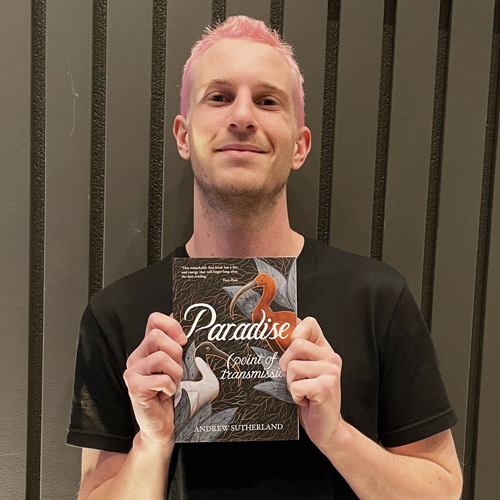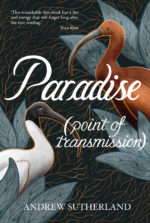Andrew Sutherland on writing Paradise (point of transmission)

Andrew Sutherland’s brilliant debut book examines Queer and HIV-positive identity from the point of diagnosis to the point of openness, resilience and transformation. In this piece Andrew reflects on writing the collection.
The Events
Here is a poem, failed or unfinished:
I was in the waiting room of a clinic in Boat Quay, Singapore. It was November 2014, though without losing myself in endless archives of emails and text messages, I would not be able to tell you the date. I had been told that this was a Queer-friendly clinic, and I believe I had been there before. Something in me felt very sure that the test I was about to take would show up HIV+, but I can’t say if this sureness was any different from the dread I always felt, as a gay man in my early twenties, before every check-up and blood test: shaded with an intellectual knowledge and no lived experience of the AIDS epidemic; with memories of watching Philadelphia at fourteen in my boys school, while the former AFL star who taught health frowned in boredom as Tom Hanks died for his Academy Award; or seeing Derek Jarman’s Blue at seventeen and promising him (myself) I’d never die; or the whispers that went around Singapore’s gay scene of whom was thought to have HIV, so you should stay away. I knew that, were the test to come up positive, I would lose the legal right to continue to reside in this place. But no time for biopolitics: the test was rapid. A prick of the thumb and an answer in two minutes. The doctor was young and Chinese-Singaporean, and my only fixed memory of the positive result was how forcefully she placed a box of tissues in front of me, before telling me the result. It was both very funny and intensely kind.
I don’t know if this is a story I am interested in telling, in this poetry collection. The sad fact is, I can hardly remember it. The event. My diagnosis in Boat Quay and the subsequent conversation with Edith, the former head of acting at LASALLE College of the Arts, in Rochor, two or so kilometres away, might be two of the defining conversations of my life. I could tell you almost nothing about what was said in either. I often try to think of poetry as the held breath between moments; all of the meaning that rushes in, barely decipherable, in the immeasurable distance between gasp and exhalation. And what remains with me, years later, is not the events themselves but the walk between, described in ‘World Tree’, the second poem of this collection; a movement between spaces that now feels weighted with an almost mythological significance in the narrative pathway of my life.
The Inexorable Logic that Governs
The other reason I hesitate over the memory of diagnosis is political, and this politic also speaks to an ambivalence, a mistrust, in the workings of narrative. Susan Sontag writes in AIDS as Metaphor (1989; two years before I was born, but who’s counting?) that ‘the move from the demonization of the illness to the attribution of fault to the patient is an inevitable one, no matter if patients are thought of as victims. Victims suggest innocence. And innocence, by the inexorable logic that governs all relational terms, suggests guilt.’ [11]
Sometimes it strikes me how exhausting it is, to reiterate the facts of my life; in medical appointments, to family members, to partners, to colleagues, in this blog post, even. Every time I disclose my status I am caught up again in the events; by the inexorable logic that governs all relational terms. How did I get it? Was I careless? Should I have known better? Did I deserve it? These are questions that live, unsaid or directly spoken, in so many of the interactions etched into the daily reality of people living with HIV.
To write poetry is a continuous sequence of disclosures, too, but in doing so I am trying to relate something other than the ‘inexorable logic’ that drags the lived experience of PLHIV back to this outmoded, stigmatising, fatiguing thing. Innocence and guilt – irrelevant. To be pitied – an equally disgusting thing. I have tried, or I am trying, to write about and to experience this illness not as a series of traumatic events, or as a tragedy that befell me in the past, but as something that moves inside of me with a continuity that connects me to the lived experience of many others, and propels me forward into a future; adding to the measure of my selfhood, instead of limiting it, or cutting it short. I want to imagine something other than the narratives that people seem to demand.
Tell Me What I Don’t Know
There is a tension in this, of course, that cannot quite be solved. So much of the experience of living with HIV, at least in a privileged context, with the availability of antiretroviral medication, is experienced and defined by the shadows and afterimages of the virus, rather than the virus itself. To comply with antiretroviral medication, one hopes, is to never be sick, even while you are always sick. And in this book – this collection of poems that spans the last several years of my life – I am as tied to the events, the narratives, the trauma of transmission, experiences of stigma and personal loss, as I am to the attempts to evolve beyond them.
In this collection, the narratives surrounding my ongoing HIV status meet with the cultural signifiers that have shaped my aesthetic practices and seem to chase me down the long corridors of my life; from my obsession with the casually coded Queerness of ’90s vampire movies to my childhood fantasies of Norse mythology, or the sci-fi conceits that, to me, feel so comparable to the experience of living with HIV. They accumulate, these signifiers and my personal history. They transform. In the poem, they become something in-between.
What I hope you can find alongside me is that Poz poetics can be sad, and rooted in tragedy, and this is fair and honest, but they can also be funny, and they can be lively, and they can be sexy. Believe me: I am very sexy, and so are these poems. Relate to me. Be with me.



